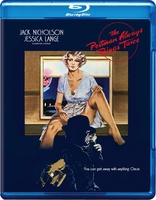The Postman Always Rings Twice Blu-ray Movie
HomeThe Postman Always Rings Twice Blu-ray Movie 
Warner Bros. | 1981 | 121 min | Rated R | Jan 21, 2014Movie rating
6.7 | / 10 |
Blu-ray rating
| Users | 4.5 | |
| Reviewer | 4.0 | |
| Overall | 4.0 |
Overview
The Postman Always Rings Twice (1981)
The sensuous wife of a road stop proprietor and a drifter begin a steamy affair and conspire to murder her Greek husband.
Starring: Jack Nicholson, Jessica Lange, John Colicos, Michael Lerner, John P. RyanDirector: Bob Rafelson
| Thriller | Uncertain |
| Crime | Uncertain |
| Drama | Uncertain |
Specifications
Video
Video codec: MPEG-4 AVC
Video resolution: 1080p
Aspect ratio: 1.77:1
Original aspect ratio: 1.85:1
Audio
English: DTS-HD Master Audio Mono (48kHz, 24-bit)
French: Dolby Digital Mono
German: Dolby Digital Mono
Italian: Dolby Digital Mono
Spanish: Dolby Digital Mono
Spanish: Dolby Digital Mono (Spain)
Portuguese: Dolby Digital Mono
Subtitles
English SDH, French, German SDH, Italian SDH, Japanese, Portuguese, Spanish
Discs
50GB Blu-ray Disc
Single disc (1 BD)
Playback
Region A, B (C untested)
Review
Rating summary
| Movie | 4.0 | |
| Video | 3.5 | |
| Audio | 4.0 | |
| Extras | 3.0 | |
| Overall | 4.0 |
The Postman Always Rings Twice Blu-ray Movie Review
Love Among the Ruined
Reviewed by Michael Reuben January 22, 2014After multiple postponements, director Bob Rafelson's 1981 adaptation of the classic 1934 James M. Cain novel The Postman Always Rings Twice has finally found its way to Blu-ray. As described in the commentary newly recorded for this release, the film resulted from several happy accidents. Star Jack Nicholson, who had previously made three films with Rafelson, thought that Rafelson wanted him to star in a Postman remake, but Rafelson had no plans to do the film. He'd simply predicted that Nicholson's career would resemble that of John Garfield, star of the 1946 filmed version with Lana Turner, a classic film noir and the first American adaptation of Cain's novel. When Rafelson found himself persona non grata in Hollywood after the independent style of working he'd developed in his own production company, BBS, didn't sit well with studio executives, Nicholson suggested they proceed with the old suggestion that Rafelson, in fact, had never made. Meanwhile, Rafelson had become intrigued with a young American playwright who, at that point, had never written a screenplay. His name was David Mamet. When Rafelson's assistant first read Mamet's new adaptation of the Cain novel, he was appalled; it was all dialogue, with no stage directions. Rafelson, on the other hand, was delighted with Mamet's spare, efficient dialogue. He was the director; stage directions were his problem. Anyone familiar with director Tay Garnett's 1946 Postman will find Rafelson's film a shock, because it has an entirely different rhythm, even though the basic story elements are the same. Both Rafelson and Mamet felt that Garnett's film left out the essence of the sado-masochistic love affair around which Cain's story revolved (in no small part, because the era's Production Code wouldn't allow it). More to the point, Rafelson's filmmaking style has never lent itself to the kind of taut, clockwork precision on which classic film noir depends, where fate wraps the characters ever more tightly in its grasp, until they choke out their last breath. All of Rafelson's films, even a thriller like Black Widow (1987), have a loosely episodic feel that arises from Rafelson's relentless focus on the authentic expression of character. If a scene reveals something about a person, he'll never cut it for pacing. Similar concerns underlay Rafelson's decision to change the story's ending from both the novel and Garnett's film (which followed the novel). Despite its roots in crime fiction, Rafelson didn't view Postman as a morality tale. To him, it was a love story.
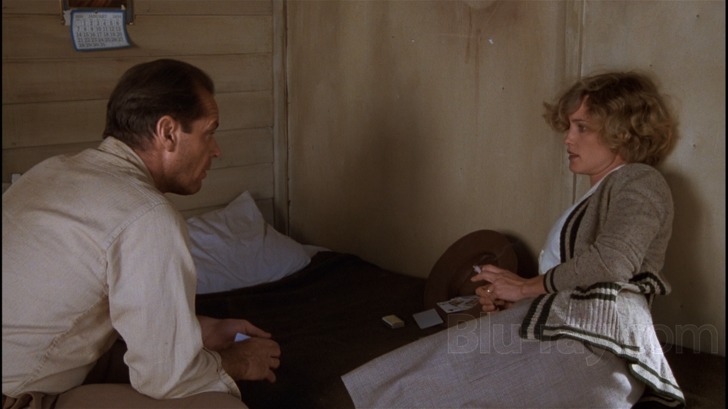
The setting of Rafelson's Postman is the same as in the 1946 film, but right at the outset important differences are established. The drifter, Frank Chambers (Jack Nicholson), who stops at the Twin Oaks diner and gas station outside Los Angeles, isn't just a working stiff down on his luck; he's a petty crook and con man who has the look of someone with a long criminal record. The owner of the establishment, Nick Papadakis (John Colicos, who was familiar primarily to fans of the original Battlestar Galactica, on which he played the treacherous Baltar), has been restored to the Greek immigrant that Cain wrote, complete with thick accent, exuberant temperament and extended family. And the story's femme fatale, Cora Papadakis (Jessica Lange, still relatively unknown), is no longer a cool, detached blonde whose entrance is preceded by a dropped lipstick; instead, she's a beautiful but hard-working cook and housekeeper over whom discontent hangs like a palpable cloud. The affair that begins between Cora and Frank is famous for its frank sexuality, although, as Rafelson points out, there isn't a nude scene in the entire film. (Nevertheless, the MPAA initially rated it X.) It's a relationship based on equal parts attraction and repulsion, and their scenes together are almost disturbing in their animal frankness. Their initial encounter on a kitchen table where Cora has been baking bread is the film's best known scene, but a later coupling is perhaps even more revealing, because it involves injury and murder and occurs at a time when sane people would be doing something other than indulging their passions. Just as Mamet's script restores ethnicity to Cora's husband, it also gives it to the defense lawyer who comes to the rescue of Nick and Cora when their affair becomes a murder plot against Cora's husband. Katz (Michael Lerner) is a smart Jewish lawyer who immediately spots that the aggressive D.A., Sackett (William Traylor), is playing the lovers off against each other. But Katz also identifies where the real power lies and, in a turn of events utterly different from anything seen in the 1946 film, he strikes a deal with several insurance companies to get his clients off the hook. Mamet, who would go on to write The Verdict and write and direct House of Games and The Spanish Prisoner, must have relished scripting this mini-drama of legal con artistry. (Rafelson claims that he directed these sequences with no understanding of what was happening.) Warning: Readers unfamiliar with any version of The Postman Always Rings Twice should skip the rest of this section. It contains no spoilers specific to the 1981 film, but it does reveal plot elements common to both the 1946 and 1981 versions, as well as the novel. The film's extended third act after Katz's legal maneuvers is where Rafelson's Postman most differs from both the prior film and Cain's novel. After Cora and Frank effectively get away with murder, a sense of doom should pervade the narrative, as if a noose were slowly tightening around their necks. But Rafelson goes in the opposite direction, allowing the narrative almost to drift from episode to episode, as the couple struggles to establish a life together. Even the reappearance of a figure from the past with the power to expose them is handled differently in Mamet's script. The threat is more quickly dispatched, serving primarily as yet another stage in the couple's evolving relationship. As Rafelson explains, he wanted to explore whether Frank and Cora could learn to be normal people. His ending, which differs from Cain's, answers that question. Watch for a brief and colorful appearance by Anjelica Huston. It was her first major film role.
The Postman Always Rings Twice Blu-ray Movie, Video Quality 
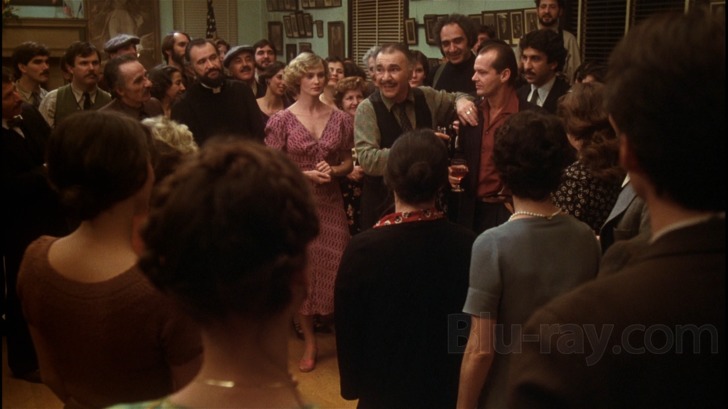
Rafelson's remake of The Postman Always Rings Twice was originally supposed to be released on Blu-ray in November 2012 along with the 1946 black-and-white classic, but it was repeatedly postponed. One can reasonably surmise that the delay was to allow for Rafelson, Nicholson and Mamet to be interviewed for the new "scene-specific" commentary. Now that the wait is over, the story on the video front is a mixture of good news and bad. First the good news. Warner couldn't recycle an old DVD transfer, because the only region 1 DVD of this Postman ever released was full-frame. The 1080p, AVC-encoded Blu-ray faithfully reproduces the fine detail, deep blacks and precisely cast shadows of cinematographer Sven Nykvist's photography, along with its evocative earth-toned palette. Postman is set almost entirely in the dry California countryside of the Depression, and Nykvist (and production designer George Jenkins) colored the image to be interesting without being overly pretty. Those who routinely accuse Warner of spreading a "teal wash" over its Blu-rays will have to wilfully ignore The Postman Always Rings Twice, because it doesn't support their theory. If they're seeing teal in this image, their sets need adjustment. Now the bad news. A BDInfo scan of this disc reveals that the 121-minute film occupies approximately 19.5 Gb of disc space, for an average bitrate of 18.41 Mbps, which is tight compression even by Warner's typically thrifty standards. With only a standard-definition trailer to accompany it, Postman was obviously intended for a BD-25. When the decision was made to include a new commentary, it wasn't added as a new language track, which would have required reauthoring the main feature. Instead, a second copy of the film was added, omitting sections without commentary; this second copy of the film runs just over 81 minutes and occupies almost 13 Gb. The combination of these two copies necessitated the use of a BD-50, but Warner did not go back and reauthor the main feature for better compression, even though the disc now had an additional 16 Gb of unused space. The result? Despite the growing skill of compressionists, at a certain point there's no avoiding artifacts, and Postman's compression is too tight. Tiny artifacts of the kind commonly called "mosquito noise" are visible at numerous points throughout the film. They can most readily be observed in large expanses of light colors such as sky or walls, but they also appear as a kind of rippling in dark portions of the frame, where they might be mistaken for aliasing. The phenomenon is difficult to capture in screenshots, but the larger the image is projected, the more obvious it will be in motion. Related to this issue is the notable absence of visible film grain (although some viewers may mistake the compression-related noise for grain). This is not the effect of so-called "DNR", a term that has now been so indiscriminately used that it barely means anything, but more likely results from the kind of sophisticated degraining software now available in the standard digital intermediate suite, which is routinely applied to newly shot film before it ever reaches the multiplex. Grain can now be removed without major sacrifice of detail, and if one is planning to aim for tight compression, degraining is a common first step. This is not to say that Postman is "unwatchable", "a travesty" or any of the other hyperbolic expressions randomly applied on internet forums. Quite the opposite is the case, especially on screens smaller than 65" in diameter. But what is especially unfortunate is that, after such a long wait and what was obviously a superior image capture, Warner did not go back and at least redo the compression to improve the bitrate and ensure that no artifacts would appear on consumers' displays. After all this time, they owed us (and Rafelson) that much.
The Postman Always Rings Twice Blu-ray Movie, Audio Quality 

Postman was released in mono, which is reproduced here in lossless DTS-HD MA 1.0. The track is in very good condition, with fine dynamic range, clear dialogue and a sweetly musical reproduction of the painfully romantic score by Michael Small (Marathon Man), one of the essential composers of the Seventies, who Rafelson says in his commentary never got his due.
The Postman Always Rings Twice Blu-ray Movie, Special Features and Extras 
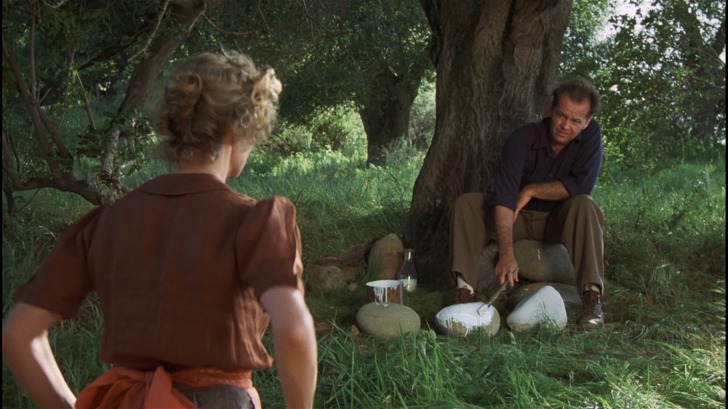
Warner's 1997 DVD of The Postman Always Rings Twice contained trailers for both the 1946 and 1981 films, as well as for Mildred Pierce. The Blu-ray contains only the 1981 trailer plus, as noted, a new scene-specific commentary.
- Scene-Specific Commentary by Bob Rafelson, David Mamet and Jack Nicholson: The three commentators were interviewed separately and their comments cut together and set to an edited version of the film. Rafelson has the most air time by far, followed by Nicholson, who is somewhat repetitious. Mamet, noted for his terse dialogue, is equally brief in his comments, but they are informative and have been incorporated throughout this review.
- Theatrical Trailer (480i; 1.78:1, enhanced; 2:53).
Though some critics liked the movie here . . . it was quite an astonishing success in Europe. People—say in France—used to approach me in bars and quote lines to me from "Five Easy Pieces." I had no idea what they were talking about since I have a defective memory. All of a sudden the audiences in France, Italy . . . all of Europe . . . were praising the film and now quoting lines from "Postman." In any event people are constantly revising their opinions of my work. They were wrong mind you, but I'll take praise from a gutter if it occurs. They sure liked it. And the sex scene on the kitchen table between Nicholson and Lange (photographed by Sven Nykvist) is just about my most praised scene. It commenced a rush on cooking lessons.
The Postman Always Rings Twice Blu-ray Movie, Overall Score and Recommendation 
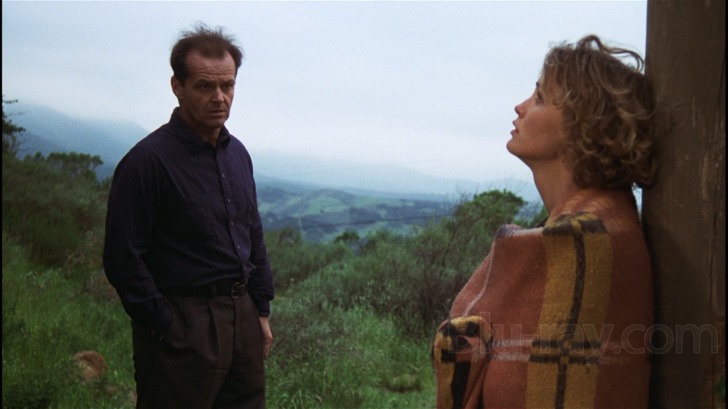
Aside from the raw sexuality of its central couple, Rafelson's version of Postman is noteworthy for its stubborn refusal to reduce Frank and Cora to film noir clichés. Nicholson's Frank is more than just a poor sap caught in the web of a manipulative woman. He chooses his fate and does so repeatedly; indeed, he virtually bullies Cora into an affair and then requires very little encouragement to begin plotting her husband's demise. Lange's Cora is a complex and often inscrutable woman, but she's no manipulator. She barely knows herself. It's as much a surprise to her as to anyone that a man she immediately recognizes as "scum" can inspire such unquestioning passion from deep inside. Cora doesn't plan; she reacts, and her reactions take her to unexpected places. If she and Frank had souls, they'd be soulmates. Highly recommended, despite the Blu-ray's video shortcomings, because it's unlikely Warner will ever revisit this title.
Similar titles
Similar titles you might also like

The Postman Always Rings Twice
1946

Footsteps in the Fog
1955

The File on Thelma Jordon
1950

The Onion Field
1979

The Dark Corner
1946

Kiss Tomorrow Goodbye
1950

Beyond a Reasonable Doubt
1956

Body Heat
1981

The Grifters 4K
1990

Marked Woman
1937

Death on the Nile
1978

The Man Who Wasn't There
2001

Sudden Fear
1952

Leave Her to Heaven
1945

Impact
Collector's Edition
1949

Murder, My Sweet
Warner Archive Collection
1944

Cast a Dark Shadow
1955

Witness for the Prosecution
Reissue
1957

Sorry, Wrong Number
1948

I Confess
Warner Archive Collection
1953
